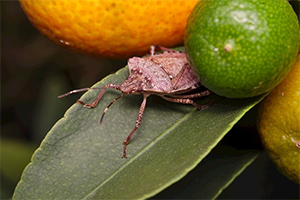$50 million in plant biosecurity projects prioritised and coordinated through national collaboration
Managing pests and diseases is a constant issue for Australia’s plant industries, and new threats are always on the horizon. Just this year Australia has seen fall armyworm spread across the north, and another unwelcome visitor, the brown marmorated stink bug, is regularly detected at our borders.
The protection of our $32 billion plant industries is a priority of the highest order, and this provides drive and focus for the collaborative Plant Biosecurity Research Initiative. At the end of its successful first phase PBRI has coordinated 15 national biosecurity projects including investments in preparedness, diagnostics and pest surveillance.
PBRI Program Director Dr Jo Luck said, “PBRI is driving value for industry through collaborative and coordinated activities. Our focus on cross-industry biosecurity issues means we can create leverage and deliver more effective approaches addressing plant biosecurity challenges.
“During the past three years PBRI members have worked together to develop and contract 15 collaborative projects worth more than $50 million. The partners have all signed on again for another three years, and we will continue to strengthen research investment for Australia’s plant industries.”
Some of the investments include:
- A dedicated xylella program manager whose focus is aimed at increasing grower awareness and preparedness for this disease which affects over 500 different plant species, including grapes, olives, citrus, stone fruit, ornamental and native species. A project has also been funded to identify insects in Australian crops that may spread the xylella bacteria if it were to arrive in Australia.
- The development of fall armyworm (FAW) awareness podcasts which address the recent arrival of the damaging effects of the FAW in northern Australian maize and sweetcorn crops. Also, research on pesticide resistance and contingency planning across multiple plant industries.
- Boosting National Diagnostics project – focused on making sure we have the capability to diagnose high priority threats to our country across all plant sectors. It also includes field sampling and testing on farm in preparation for an emergency response.
- iMapPESTS – a collaboration of government, industry, and researchers developing a mobile cross-industry plant pest surveillance network, which will provide information on endemic, established, trade sensitive or exotic pests. The project rapidly monitors and reports the presence of high-priority pests and diseases.
- A post entry quarantine diagnostics research project will deliver next generation sequencing tools to fast-track screening for pathogens of imported plant material in post-entry quarantine facilities. The technology allows plants to move through the quarantine process much more quickly, allowing industry earlier access to new germplasm.
- eDNA detection of brown marmorated stink bug project that focuses on the development of environmental DNA assays and sampling protocols for the real-time detection of brown marmorated stink bug.
- 2020 International Year of Plant Health (IYPH) was supported by a national launch, profiling everyday plant health heroes and school activities promoting the message of protecting plants, protecting lives.
In May 2020, an independent review of the PBRI, by RMCG Consulting, found that “strategic international partnerships with Better Border Biosecurity (B3) New Zealand and European Phytosanitary Research Coordination (Euphresco), were considered important to PBRI’s position in global biosecurity RD&E” and recommended that further partnerships be supported where relevant.
The PBRI, established in 2017, is a collaboration of rural research and development corporations, Plant Health Australia the Department of Agriculture, Water and the Environment and the Council of RDCs, emphasising the importance of coordinated biosecurity research, development and extension. The initiative builds critical capacity for Australian plant-based industries.
The independent review also found “that stakeholders acknowledge the critical importance of PBRI in driving collaboration of national plant biosecurity RD&E and they envisage even greater benefits from the next phase of the PBRI”.
The Phase 1 report provides more detail.
Acknowledgement: reproduced from an article by Hort Innovation

